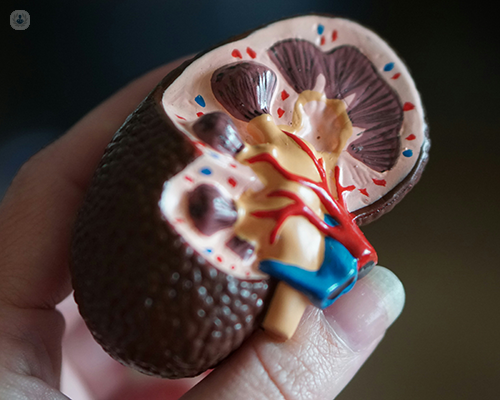Chronic kidney disease: Early detection, management, and treatment options
Written in association with:The kidneys play a crucial role in filtering waste and excess fluids from the bloodstream. When they become damaged over time, it can lead to a buildup of waste products in the body.
Dr Daniel Jones, leading consultant nephrologist, explains what chronic kidney disease is, how it is diagnosed, its treatment options, and when dialysis or a kidney transplant may be necessary.

What is chronic kidney disease?
Chronic kidney disease refers to the long-term, progressive decline in kidney function. They kidneys are responsible for filtering waste, regulating fluid levels, balancing electrolytes, and producing hormones. When the kidneys are damaged, waste and fluid build up in the body, causing a variety of health issues.
Several conditions can lead to chronic kidney disease. The most common are:
- Diabetes: Over time, high blood sugar levels can damage the small blood vessels in the kidneys.
- Hypertension: Persistent hypertension can put extra strain on the kidneys, causing damage to the blood vessels that filter waste.
- Glomerulonephritis: Inflammation of the kidney's filtering units (glomeruli), caused by infections or autoimmune disorders.
Other factors such as family history, obesity, smoking, and older age can also increase the risk.
How is chronic kidney disease diagnosed?
Chronic kidney disease often presents no symptoms in the early stages, which is why early detection is important. Diagnosing chronic kidney disease involves several tests and assessments.
The most common is a blood test called the serum creatinine test, which measures the level of creatinine in the blood. Creatinine is a waste product produced by muscles, and when kidney function declines, its levels in the blood rise. From the serum creatinine test, the glomerular filtration rate (GFR) can then be calculated as well, which is used to estimate how well the kidneys are filtering blood.
In addition, urine tests are also crucial in diagnosing chronic kidney tests. One of the most common is the albumin urine test to check for the presence of protein or albumin in the urine. Healthy kidneys don’t allow protein to pass into the urine, so the presence of protein can indicate damage to the kidneys’ filtering units.
Imaging tests such as a kidney ultrasound or CT scan may also be used to assess the size and structure of the kidneys, looking for cysts, blockages, or kidney stones. In some cases, a kidney biopsy may be recommended to determine the cause of kidney damage.
What is the treatment for chronic kidney disease?
There is no cure for chronic kidney disease, but treatment can help to slow its progression and mange the symptoms. The goal is to address the underlying cause and prevent further kidney damage. Treatment may involve:
Dietary changes
A kidney-friendly diet is essential. This involves reducing sodium, potassium, and phosphorus intake, as well as adjusting protein consumption. A nutritionist can help to design a personalised diet plan that supports kidney health.
Lifestyle modifications
Regular exercise, quitting smoking, and reducing alcohol consumption can all improve overall health and slow the progression of chronic kidney disease. Maintaining a healthy weight and managing stress are also crucial for supporting proper kidney function.
Medications
Medications are often prescribed to manage underlying conditions like high blood pressure and diabetes to prevent chronic kidney disease from reaching advanced stages. Angiotensin-converting enzyme (ACE) inhibitors or angiotensin receptor blockers (ARBs) are commonly used to control blood pressure and reduce protein in the urine.
What is dialysis, and when is it needed?
Dialysis is a medical treatment used to perform some of the essential functions of the kidneys when they fail.
There are two main types of dialysis:
- Haemodialysis: In haemodialysis, blood is removed from the body, filtered through a machine called a dialyser, and then returned to the body.
- Peritoneal dialysis: In peritoneal dialysis, a special fluid is introduced into the abdomen through a catheter to absorb waste and excess fluid from the blood vessels in the abdominal lining. The fluid is then drained, taking waste products with it.
Dialysis is required when kidney function declines to 10-15%. Change to dialysis is usually started for those which are likely to benefit, when the kidney function is less than eGFR 10ml/min.
Is a kidney transplant a viable option for all end-stage chronic kidney disease?
A kidney transplant can be a viable treatment option for patients with end-stage kidney disease (also known as kidney failure) who are otherwise in good health. However, not everyone with end-stage chronic kidney disease is eligible for a transplant.
A transplant involves replacing the damaged kidney with a healthy kidney from a donor, either living or deceased. It requires ongoing medication to prevent the body from rejecting the new kidney, but it also offers the potential for a better quality of life compared to long-term dialysis.
It’s essential to consult with a consultant nephrologist to determine the most appropriate treatment plan for managing your chronic kidney disease and maintaining kidney health. If you would like to book an appointment with Dr Daniel Jones, head on over to his Top Doctors profile today.


